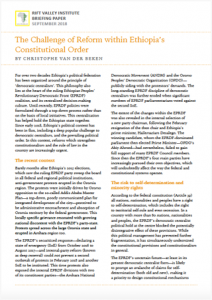For over two decades Ethiopia’s political federation has been organized around the principle of ‘democratic centralism’. This philosophy also lies at the heart of the ruling Ethiopian Peoples’ Revolutionary Democratic Front (EPRDF) coalition, and its centralized decision-making culture. Until recently, EPRDF policies were formulated through a top-down process rather than on the basis of local initiatives. This centralization has helped hold the Ethiopian state together. Since early 2018, Ethiopia’s political context has been in flux, including a deep popular challenge to democratic centralism, and the prevailing political order. In this context, reforms which strengthen constitutionalism and the rule of law in the country are increasingly urgent.

Political Economy of Cash and Markets in Sudan
The research provides a snapshot of the war in Sudan in the period from February to April 2025. However, the war is dynamic, with political



